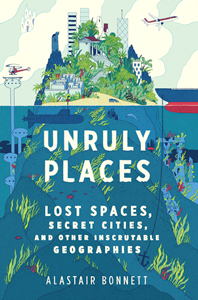Unruly Places: exotic destinations tourists have never heard of
Book review of ‘Unruly Places: Lost Spaces, Secret Cities, and Other Inscrutable Geographies’
Tim Barker/Getty Images
Share
UNRULY PLACES: LOST SPACES, SECRET CITIES, AND OTHER INSCRUTABLE GEOGRAPHIES
By Alastair Bonnett
This strange book could only have been written by a professor of social geography or the editor of an “avant-garde psychogeographical magazine.” Bonnett is both. He takes readers to exotic destinations tourists have never heard of. Even if they had, they wouldn’t want to visit half the 47 out-of-the-way places Bonnett uncovered. (An exception are the underground cities of Cappadocia in eastern Turkey, which I plan to visit in October.)
Arranged in eight categories, the bizarre places include dead cities, no man’s lands, floating islands, ephemeral places and breakaway nations. Half carry unmemorable names the reader won’t recognize, such as Zheleznogorsk, Hog’s Back Lay-By or the Nipterk P-32 Spray Ice Island. None is in Canada, although, in the preface to the Canadian edition, Bonnett discloses he once lived on the outskirts of Hamilton, an experience that sparked his interest in unruly places.
Zheleznogorsk is a secret Soviet city founded in 1950 to manufacture nuclear weapons, and never appeared on any map until 1992. Hog’s Back is a grassy hill in Surrey (the author is English), home to a phenomenon called dogging that involves outdoor sex in wooded areas and parking lots. This “unruly” place left me indifferent, but, for every such disappointment, there’s a fascinating essay on places like Sealand. This was founded in 1967 by a retired British army major on an abandoned Second World War gun platform off the Essex coast. Roy Bates declared Sealand sovereign from the U.K., and named himself Sealand’s prince and wife, Joan, his princess. This romantic gesture led to prosperity, as they issued coins and postage stamps before hitting the jackpot, leasing Sealand to a firm that turned it into the site for an off-limits Internet server.
Then there are the freakish twin villages of Baarle-Nassau and Baarle-Hertog, located in the Netherlands and Belgium, respectively, with multiple “enclaves” of each embedded within the other. A particular home can straddle both nations. Local custom levies tax by the country in which a home’s front door resides, so homeowners may shift their front doors a few feet in order to be taxed in the cheaper jurisdiction, a practice known as “door-shunting.”
Each entry includes Google Earth coordinates, except for mobile places such as The World, a floating gated community for the super-rich. Now that’s one unruly place I’d like to visit.
